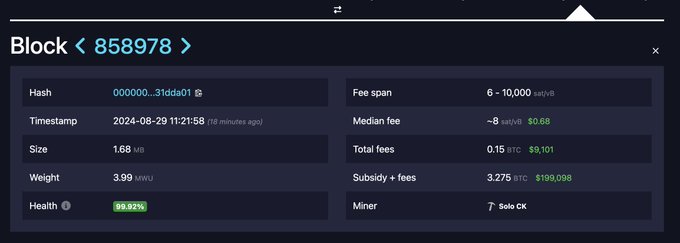A solo Bitcoin miner has achieved a rare feat by successfully mining a block worth 3.275 BTC, valued at approximately $199,098.
This unexpected win highlights the unpredictable nature of Bitcoin mining, where individual miners with limited computing power occasionally succeed despite overwhelming odds.
The Mathematics Behind the Mining
To put the scale of this achievement into perspective, consider the following calculation. If a solo miner operates a single piece of mining equipment, such as an AntMiner S19 XP ASIC, which can produce a hash rate of 140 terahashes per second (TH/s), they are contributing just 0.000021875% of the total network hash rate, which is currently around 640 million TH/s. This means the miner had a 1 in 4,571,428 chance of mining a block.
Given that one block is mined approximately every 10 minutes, it would statistically take about 87 years for a solo miner with such equipment to successfully mine a block. Moreover, the cost of running an AntMiner S19 XP ASIC, considering the average electricity cost, is estimated at around $130 per month.
The odds of a solo miner successfully mining a Bitcoin block are comparable to winning a lottery.
The significant time investment and operational costs make solo mining a high-risk endeavor, especially when competing against large mining pools with much greater computational power.











